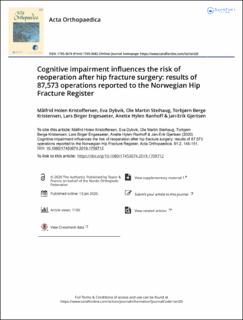| dc.contributor.author | Kristoffersen, Målfrid Holen | |
| dc.contributor.author | Dybvik, Eva Hansen | |
| dc.contributor.author | Steihaug, Ole Martin | |
| dc.contributor.author | Kristensen, Torbjørn | |
| dc.contributor.author | Engesæter, Lars B. | |
| dc.contributor.author | Ranhoff, Anette Hylen | |
| dc.contributor.author | Gjertsen, Jan-Erik | |
| dc.date.accessioned | 2021-02-15T13:16:38Z | |
| dc.date.available | 2021-02-15T13:16:38Z | |
| dc.date.created | 2020-09-22T12:48:41Z | |
| dc.date.issued | 2020 | |
| dc.Published | Acta Orthopaedica. 2020, 91 (2), 146-151. | |
| dc.identifier.issn | 1745-3674 | |
| dc.identifier.uri | https://hdl.handle.net/11250/2728124 | |
| dc.description.abstract | Background and purpose — About one-fourth of hip fracture patients have cognitive impairment. We investigated whether patients’ cognitive function affects surgical treatment, risk of reoperation, and mortality after hip fracture, based on data in the Norwegian Hip Fracture Register (NHFR).
Patients and methods — This prospective cohort study included 87,573 hip fractures reported to the NHFR in 2005–2017. Hazard rate ratios (HRRs) for risk of reoperation and mortality were calculated using Cox regression adjusted for sex, age, ASA class, fracture type, and surgical method.
Results — Cognitive impairment was reported in 27% of patients. They were older (86 vs. 82 years) and had higher ASA class than non-impaired patients. There were no differences in fracture type or operation methods. Cognitively impaired patients had a lower overall reoperation rate (4.7% vs. 8.9%, HRR 0.71; 95% CI 0.66–0.76) and lower risk of reoperation after osteosynthesis (HRR 0.58; CI 0.53–0.63) than non-impaired patients. Cognitively impaired hip fracture patients had an increased reoperation risk after hemiarthroplasty (HRR 1.2; CI 1.1–1.4), mainly due to dislocations (1.5% vs. 1.0%, HRR 1.7; CI 1.3–2.1). Risk of dislocation was particularly high following the posterior approach (4.7% vs. 2.8%, HRR 1.8; CI 1.2–2.7). Further, they had a higher risk of reoperation due to periprosthetic fracture after uncemented hemiarthroplasty (HRR 1.6; CI 1.0–2.6). Cognitively impaired hip fracture patients had higher 1-year mortality than those without cognitive impairment (38% vs. 16%, HRR 2.1; CI 2.1–2.2).
Interpretation — Our findings support giving cognitively impaired patients the same surgical treatment as non-impaired patients. But since the risk of hemiprosthesis dislocation and periprosthetic fracture was higher in cognitively impaired patients, they should probably not have posterior approach surgery or uncemented implants. | en_US |
| dc.language.iso | eng | en_US |
| dc.publisher | Taylor & Francis | en_US |
| dc.rights | Navngivelse 4.0 Internasjonal | * |
| dc.rights.uri | http://creativecommons.org/licenses/by/4.0/deed.no | * |
| dc.title | Cognitive impairment influences the risk of reoperation after hip fracture surgery: results of 87,573 operations reported to the Norwegian Hip Fracture Register | en_US |
| dc.type | Journal article | en_US |
| dc.type | Peer reviewed | en_US |
| dc.description.version | publishedVersion | en_US |
| dc.rights.holder | Copyright 2020 The Author(s). | en_US |
| cristin.ispublished | true | |
| cristin.fulltext | original | |
| cristin.qualitycode | 1 | |
| dc.identifier.doi | 10.1080/17453674.2019.1709712 | |
| dc.identifier.cristin | 1832071 | |
| dc.source.journal | Acta Orthopaedica | en_US |
| dc.source.40 | 91 | |
| dc.source.14 | 2 | |
| dc.source.pagenumber | 146-151 | en_US |
| dc.identifier.citation | Acta Orthopaedica. 2020, 91 (2), 146–151 | en_US |
| dc.source.volume | 91 | en_US |
| dc.source.issue | 2 | en_US |

